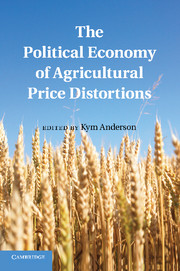Book contents
- Frontmatter
- Contents
- List of Figures
- List of Tables
- Contributors
- Foreword
- Preface
- Abbreviations and Acronyms
- PART ONE Introduction
- PART TWO CONCEPTUAL FRAMEWORKS AND HISTORICAL ORIGINS
- THREE Political Economy of Agricultural Distortions
- FOUR Special Interests versus the Public Interest in Policy Determination
- FIVE Anglo-French Trade, 1689–1899
- SIX Agricultural Protection Growth in Europe, 1870–1969
- SEVEN Determinants of United States Farm Policies
- EIGHT Agricultural Distortions in the Transition Economies of Asia and Europe
- Part Three Political Econometrics: the Past Fifty Years
- Appendix: Coverage and Distribution of Assistance across Countries and Products, 1955–2007
- Index
- References
FIVE - Anglo-French Trade, 1689–1899
Agricultural Trade Policies, Alcohol Taxes, and War
Published online by Cambridge University Press: 05 July 2011
- Frontmatter
- Contents
- List of Figures
- List of Tables
- Contributors
- Foreword
- Preface
- Abbreviations and Acronyms
- PART ONE Introduction
- PART TWO CONCEPTUAL FRAMEWORKS AND HISTORICAL ORIGINS
- THREE Political Economy of Agricultural Distortions
- FOUR Special Interests versus the Public Interest in Policy Determination
- FIVE Anglo-French Trade, 1689–1899
- SIX Agricultural Protection Growth in Europe, 1870–1969
- SEVEN Determinants of United States Farm Policies
- EIGHT Agricultural Distortions in the Transition Economies of Asia and Europe
- Part Three Political Econometrics: the Past Fifty Years
- Appendix: Coverage and Distribution of Assistance across Countries and Products, 1955–2007
- Index
- References
Summary
Britain – contrary to received wisdom – was not a free trader for most of the 1800s and, despite the repeal of the Corn Laws, continued to have higher tariffs than the French until the last few decades of the 19th century. Moreover, British tariffs tended to be reformed by first lowering or abolishing duties on items in which Britain had enjoyed a comparative advantage or which were usually not significant for their trade. The few tariffs that remained – particularly on items such as wine and spirits – were among the most protective of all tariffs and were mostly the same sorts of tariffs decried by Adam Smith in the Wealth of Nations. These, in fact, went back to the earliest period of British mercantilism in the 17th century, when war and politics totally distorted trade relations between Britain and France for the next 200 years.
Although later authors have tended to dismiss these high tariffs as being “merely” for revenue, their high level, the selective nature of the duties, the difficulty of separating out revenue from protection, and the seriousness with which British rivals such as France treated changes in these tariffs shows how misleading has been the simplistic story of free-trade Britain that we have inherited.
The argument is this: An English state eager to reduce its trade deficit with France in the late 17th century found that opportunity as a result of the wars that ran from 1689–1713.
- Type
- Chapter
- Information
- The Political Economy of Agricultural Price Distortions , pp. 126 - 140Publisher: Cambridge University PressPrint publication year: 2010
References
- 3
- Cited by

